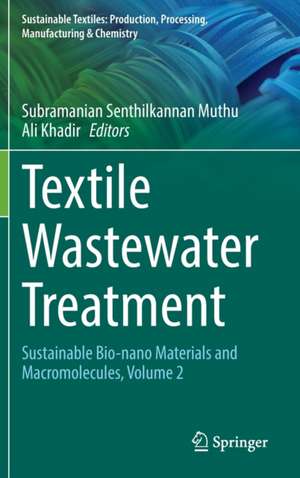Textile Wastewater Treatment: Sustainable Bio-nano Materials and Macromolecules, Volume 2: Sustainable Textiles: Production, Processing, Manufacturing & Chemistry
Editat de Subramanian Senthilkannan Muthu, Ali Khadiren Limba Engleză Hardback – 19 aug 2022
| Toate formatele și edițiile | Preț | Express |
|---|---|---|
| Paperback (2) | 639.73 lei 6-8 săpt. | |
| Springer Nature Singapore – 20 aug 2023 | 639.73 lei 6-8 săpt. | |
| Springer Nature Singapore – 16 aug 2023 | 646.30 lei 6-8 săpt. | |
| Hardback (2) | 895.45 lei 6-8 săpt. | |
| Springer Nature Singapore – 19 aug 2022 | 895.45 lei 6-8 săpt. | |
| Springer Nature Singapore – 15 aug 2022 | 901.88 lei 6-8 săpt. |
Din seria Sustainable Textiles: Production, Processing, Manufacturing & Chemistry
- 24%
 Preț: 778.71 lei
Preț: 778.71 lei - 18%
 Preț: 726.37 lei
Preț: 726.37 lei - 20%
 Preț: 567.99 lei
Preț: 567.99 lei - 20%
 Preț: 692.85 lei
Preț: 692.85 lei - 18%
 Preț: 790.28 lei
Preț: 790.28 lei - 18%
 Preț: 1002.61 lei
Preț: 1002.61 lei - 18%
 Preț: 951.29 lei
Preț: 951.29 lei - 18%
 Preț: 781.62 lei
Preț: 781.62 lei - 15%
 Preț: 583.93 lei
Preț: 583.93 lei - 15%
 Preț: 694.04 lei
Preț: 694.04 lei - 15%
 Preț: 637.46 lei
Preț: 637.46 lei - 15%
 Preț: 575.77 lei
Preț: 575.77 lei - 15%
 Preț: 576.09 lei
Preț: 576.09 lei - 15%
 Preț: 578.05 lei
Preț: 578.05 lei - 15%
 Preț: 637.78 lei
Preț: 637.78 lei - 15%
 Preț: 579.34 lei
Preț: 579.34 lei - 15%
 Preț: 701.72 lei
Preț: 701.72 lei - 15%
 Preț: 642.64 lei
Preț: 642.64 lei - 18%
 Preț: 948.79 lei
Preț: 948.79 lei - 15%
 Preț: 575.09 lei
Preț: 575.09 lei - 15%
 Preț: 696.68 lei
Preț: 696.68 lei
Preț: 895.45 lei
Preț vechi: 1092.01 lei
-18% Nou
Puncte Express: 1343
Preț estimativ în valută:
171.37€ • 178.25$ • 141.47£
171.37€ • 178.25$ • 141.47£
Carte tipărită la comandă
Livrare economică 15-29 aprilie
Preluare comenzi: 021 569.72.76
Specificații
ISBN-13: 9789811928512
ISBN-10: 9811928517
Pagini: 272
Ilustrații: VII, 272 p. 42 illus., 30 illus. in color.
Dimensiuni: 155 x 235 mm
Greutate: 0.57 kg
Ediția:1st ed. 2022
Editura: Springer Nature Singapore
Colecția Springer
Seria Sustainable Textiles: Production, Processing, Manufacturing & Chemistry
Locul publicării:Singapore, Singapore
ISBN-10: 9811928517
Pagini: 272
Ilustrații: VII, 272 p. 42 illus., 30 illus. in color.
Dimensiuni: 155 x 235 mm
Greutate: 0.57 kg
Ediția:1st ed. 2022
Editura: Springer Nature Singapore
Colecția Springer
Seria Sustainable Textiles: Production, Processing, Manufacturing & Chemistry
Locul publicării:Singapore, Singapore
Cuprins
Treatment of textile wastewater by nanoparticles.- Magnetic-based biocomposites in dye adsorption.- Application of wheat bran/straw-based biomaterials in textile wastewater.- Application of peel-based biomaterials in textile wastewater.- Applications of Luffa Based Biomaterials in Textile Wastewater.- Recent Trends in Textile Wastewater Treatment using Agricultural Waste.- Application of Agricultural Waste in Anionic Dyes Removal from Wastewater.- Application of Composite Polymeric Membranes in Textile Wastewater.- Chitosan and Chitosan-based Nanocomposite Membranes in the Removal of Synthetic Dye from Effluent Wastewaters.- Application of Biobased and Inorganic Composite Materials to Remove Heavy Metals from Textile Effluent.- Potential of pyrolysis biochar as an eco-friendly biosorbent for dye removal from industrial wastewaters.- Application of Rice Husk-Based Biomaterial in Textile Wastewater Treatment.- Application of Hydroxyapatite in Textile Wastewater.
Notă biografică
Dr. Subramanian Senthilkannan Muthu currently works for SgT Group as Head of Sustainability, and is based out of Hong Kong. He earned his PhD from The Hong Kong Polytechnic University, and is a renowned expert in the areas of Environmental Sustainability in Textiles & Clothing Supply Chain, Product Life Cycle Assessment (LCA) and Product Carbon Footprint Assessment (PCF) in various industrial sectors. He has five years of industrial experience in textile manufacturing, research and development and textile testing and over a decade's of experience in life cycle assessment (LCA), carbon and ecological footprints assessment of various consumer products. He has published more than 100 research publications, written numerous book chapters and authored/edited over 100 books in the areas of Carbon Footprint, Recycling, Environmental Assessment and Environmental Sustainability.
Ali Khadir is an environmental engineer and a member of the Young Researcher and Elite Club, Islamic Azad University of Shahre Rey Branch, Tehran, Iran. He has published several articles and book chapters in reputed international publishers. He also has been the reviewer of journals and international conferences. His research interests center on emerging pollutants, dyes, and pharmaceuticals in aquatic media, advanced water and wastewater remediation techniques and technology.
Ali Khadir is an environmental engineer and a member of the Young Researcher and Elite Club, Islamic Azad University of Shahre Rey Branch, Tehran, Iran. He has published several articles and book chapters in reputed international publishers. He also has been the reviewer of journals and international conferences. His research interests center on emerging pollutants, dyes, and pharmaceuticals in aquatic media, advanced water and wastewater remediation techniques and technology.
Textul de pe ultima copertă
In this second volume, various materials such as Magnetic-based biocomposites, wheat bran/straw-based biomaterials, peel-based biomaterials, luffa Based Biomaterials, composite polymeric membranes, rice husk, hydroxyapatite etc for treating textile waste water are highlighted. One of the major pollutants in the textiles and fashion sector is textile waste water. Textile wastewater can lead to serious environmental issues if discharged without proper and sufficient treatment. The materials employed along with the technologies available to trate the waste water are the key. There are a lot of advancements in terms materials, technologies employed for textile waste water treatment. Sustainable bio-nano materials and macro molecules play a major role in the efficient textile waste treatment.
Caracteristici
Highlights advances in textile waste water treatment using sustainable bio-nano materials and macro molecules Presents biocomposites such as magnetic biocomposites, straw-based biomaterials, polymeric membranes, etc. Includes various case studies to emphasize the technologies in waste water treatment
